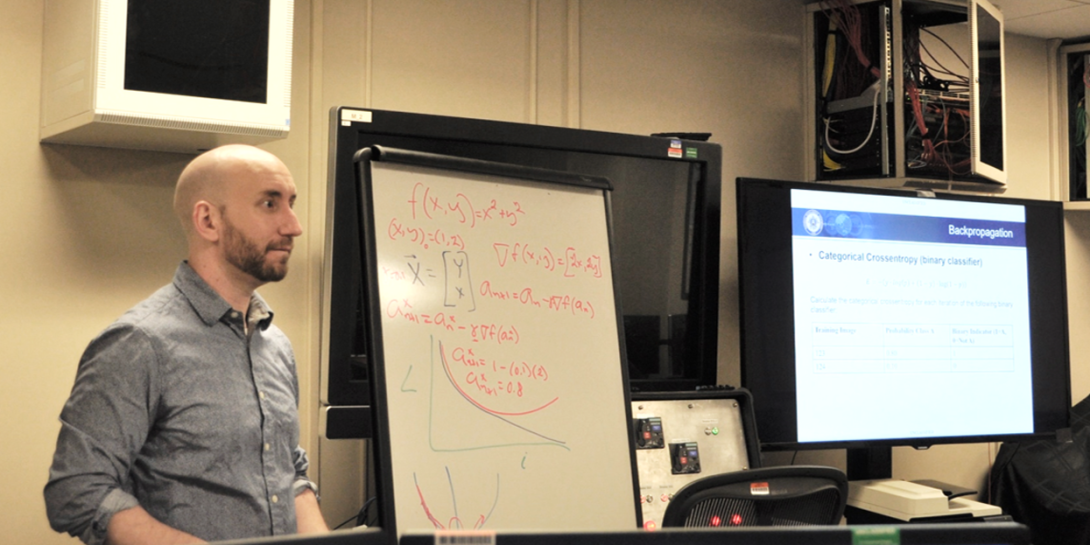Intelligence University Adds Advanced Data Curriculum
The National Intelligence University (NIU) has upgraded its curriculum with an enhanced focus on applied data science for intelligence. This thrust, which reflects the changing global threat picture, includes the creation of a certificate program for those seeking to specialize in the discipline.
“Data science is our future,” declares Mark Bailey, a member of the faculty within the cyber intelligence and data analytics department at the NIU, which is part of the Oettinger School of Science and Technology Intelligence. “The writing is on the wall with that, and it’s an opportunity that we really need to take advantage of.”
Bailey claims that the NIU is the only university in the world that provides a rigorous data science education for strategic intelligence in a classified environment. He explains that this new curriculum has evolved from modest beginnings around 2015. A change then in strategic direction within the intelligence community supported a data science curriculum within the NIU. It sponsored a study of the data science academic landscape, and study results were combined with input from the intelligence community at large to identify general themes. The curriculum grew out of this effort, Bailey relates.
The course material was chosen by a host of experts from the intelligence community, with individual course directors and faculty selecting their own specific material, he continues. Government, industry and military experts constitute the faculty. They are complemented by a state-of-the-art laboratory environment that is operated and supported by the Department of Energy, Bailey reports.
“The curriculum is designed to allow students to understand the evolving role of data science within the intelligence community—within the context of both capabilities and potential threats,” he says. “So students learn to assess the applications and limitations of data science within the context of strategic intelligence. They learn foundational mathematical concepts and state-of-the-art data science methods, and they learn how to effectively communicate the meaning of inferred information to strategic leaders.”
Bailey explains that the year-long curriculum aims to create professionals who are adept at data science as opposed to data scientists. The goal is to give people an understanding of the technical rigor and foundational concepts of data science so they can be effective leaders within their organizations.
Some of the coursework focuses on data science fundamentals, Bailey allows. But more detailed work comes up in data science communications and visualization, which is more strategically focused.
Bailey likens this to the approach taken in World War II for artillerymen. On the battlefield, the gunners knew a bit about factors such as wind speed and direction, barometric pressure and muzzle velocity. But the highly detailed work was left to teams of mathematicians in the United States who crunched numbers across all the variables to generate artillery charts to guide the operators in the field.
The curriculum’s primary emphasis is built around four primary themes, which represent the courses offered. One is a survey data science course that broadly discusses the evolving role of data science within the intelligence community along with the ethical implications of big data. It introduces the students to the basics of coding in Python, the language of choice in the NIU.
Another course focuses on data science mathematics to provide foundational mathematical knowledge relevant to data science applications, Bailey adds. Yet another course, which concentrates on methods, allows students to build their own data science analytical tools in Python. The fourth course is the one that focuses on data science communications and visualization, and it empowers students to communicate their work effectively to senior intelligence leaders.
These courses are part of a program for students seeking a Master of Science and Technology Intelligence degree. Students who choose a data science option can pursue a cyber intelligence and data analytics certificate. However, this August, the data science and intelligence concentration will become a stand-alone entity with its own certificate option. For the long term, new technology developments and evolving needs of the intelligence community will spur continued growth of the curriculum at the NIU, Bailey predicts.
Both the changing nature of the threat and emerging applications are the main drivers for shaping this curriculum. “The threat evolves as the technology evolves,” Bailey says. “They are inextricably linked.”




Comments